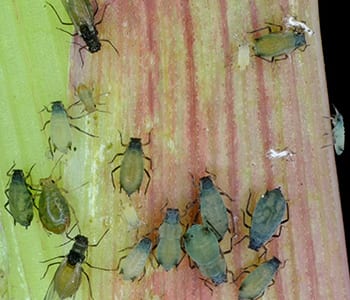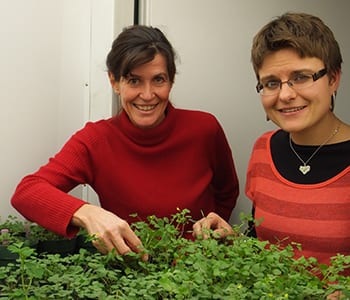Impact
BTI’s Impact on Society
Boyce Thompson Institute’s mission, “to advance and communicate scientific discovery in plant biology to improve agriculture, protect the environment, and enhance human health,” specifies that the goal of plant science is to benefit society. William Boyce Thompson observed that people’s basic needs for food, clothing, and shelter must be met before greater social goals of education and political stability can be met. He wanted the scientists at the Boyce Thompson Institute to explore the mechanisms of the most elemental life processes, and knew that this progress would ultimately provide the foundation upon which many discoveries could be made.
Discoveries Making an Impact
Seminal BTI discoveries include:
- Vaccine or protein production in insect cell lines
- Natural small molecules to improve plant and human health
- Plant disease resistance
- Salicylic acid pathway for systemic acquired resistance
- Plant and bacterial proteins in innate and effector-triggered immunity
- Plant insect resistance—plant genes and small signaling molecules
- Plant-based vaccines
Impact on Agriculture
 Researchers at BTI are unlocking valuable secrets hidden in basic plant functions that could reduce the negative ecological effects of agricultural practices. Currently, expensive and environmentally harmful petroleum-based fertilizers and pesticides continue to be a major issue in modern agriculture, but these researchers may help reduce their use:
Researchers at BTI are unlocking valuable secrets hidden in basic plant functions that could reduce the negative ecological effects of agricultural practices. Currently, expensive and environmentally harmful petroleum-based fertilizers and pesticides continue to be a major issue in modern agriculture, but these researchers may help reduce their use:
Maria Harrison’s research, for example, will help to reduce the use of synthetic fertilizers. She studies the symbiotic relationship between plants and fungi that interact with plant roots and induce structures called arbuscular mycorrhizae. The fungi help plants absorb the crucial mineral phosphate in exchange for plant-provided carbon. “We’re studying which genes control these interactions, and how the process works,” says Harrison. “The hope is that, with a fuller understanding of the process, we can eventually reduce the amount of required applied synthetic fertilizers in agriculture.” The research may lead to the ability to enhance phosphate absorption through plant genetic engineering, thus decreasing the need for synthetic fertilizers.

Additionally, Georg Jander and his laboratory tackle the issue of pesticide use. Jander studies the natural chemical defenses that plants exhibit when attacked by aphids and other insect herbivores. Certain plants are champions at defending against pests, thanks to genetic differences in their ability to produce protective chemicals. For instance, natural variation in the accumulation of plant chemicals called glucosinolates, which are responsible the characteristic taste of vegetables such as cabbage and radish, also can provide effective defense against herbivory. “The genes that we find can be used for crop improvement through breeding or genetic engineering approaches,” says Jander. “So, this could lead to less pesticide use and more biocontrol measures in crops.”
Thanks to Harrison and Jander, dedicated basic plant science research not only reveals new insight to plant chemistry and genetics, but can also revolutionize the way we grow our food—with the ultimate goal of increasing yield with sustainable practices.
Impact on Environment
As the earth faces greater pressures due to climate change, fostering sustainable practices that support ecosystems able to withstand these changes is increasingly crucial. Reducing our reliance on petrochemicals and transitioning to more environmentally-friendly replacements is a key effort in this mission. At BTI, researchers are working on solutions that will help us do just that.
For example, David Stern’s work focuses on combining genetics, biochemistry and a research tool called microfluidics to create algal species that can efficiently produce useful hydrocarbons. These hydrocarbons can be used as sources of biofuels or specialty oils such as lubricants, substituting as a source for nonrenewable petrochemicals. His team implants genes found in an algal species that produces high amounts of unique, easily processed hydrocarbons into other species that are better adapted to commercial pipelines.
 Reducing the use of one of the earth’s finite resources is a goal of Maria Harrison’s research, which examines the relationship between plants and symbiotic fungi that live in their root systems and enables more efficient phosphate uptake. By studying this dynamic, Harrison can potentially unlock new ways to naturally enhance plants’ phosphate absorption, reducing the need for synthetic phosphate fertilizers.
Reducing the use of one of the earth’s finite resources is a goal of Maria Harrison’s research, which examines the relationship between plants and symbiotic fungi that live in their root systems and enables more efficient phosphate uptake. By studying this dynamic, Harrison can potentially unlock new ways to naturally enhance plants’ phosphate absorption, reducing the need for synthetic phosphate fertilizers.
Finally, Georg Jander’s research could lead to lower pesticide use; he studies plants’ natural chemical defenses against insect pests. Some individual plants create such nasty-tasting compounds that the insects avoid them altogether. Studying the genes of these “super-defender” plants could lead to new, pesticide-free ways of managing insect pests.
Impact on Health
At the Boyce Thompson Institute, many of our scientists focus on research that directly relates to human health.
For example, Jim Giovannoni studies the composition and regulation of biochemical pathways that influence shelf-life, appearance, taste, and nutrient content of fruits and vegetables. If more attractive and appetizing produce is available at grocery stores, the hope is people will eat more of this healthy food group. “A lot of our fruits and veggies have been bred for yield, handling and transport—we’ve lost sight of flavor and quality,” says Giovannoni. By understanding the underlying biology of traits important for both production and consumer quality, new breeding targets will be identified that better balance the needs of growers while meeting the quality demands of consumers, thus promoting better food choices.
Meanwhile, Dan Klessig researches how the plant hormone salicylic acid regulates plant immunity. Salicylic acid has been used for millennia as part of herbal-based medicine and for more than a century in the form of aspirin (acetyl salicylic acid) to reduce pain, fever, inflammation, and the risk of heart attack, stroke, and certain cancers. Using knowledge gained from this research his group is now both discovering new targets of aspirin in humans implicated in hepatitis and neurodegenerative diseases, as well as the previously mentioned diseases, and identifying new and much more effective natural or synthetic derivatives of salicylic acid.
 Finally, Frank Schroeder uses the nematode C. elegans as a model to identify signaling molecules that may hold the key to longer life span and preventing age-associated disease, such as diabetes or Alzheimer’s disease. C. elegans is a perfect model system for the study of human aging because the mechanisms that control life span and metabolism in this tiny roundworm are very similar to those in humans. Recently, the Schroeder lab identified a family of signaling molecules that potently increase life span in C. elegans. Current research focuses on determining the molecular targets of these signaling molecules, which will provide a basis for the design of drug-like molecules that could extend human life span and delay aging-associated decay.
Finally, Frank Schroeder uses the nematode C. elegans as a model to identify signaling molecules that may hold the key to longer life span and preventing age-associated disease, such as diabetes or Alzheimer’s disease. C. elegans is a perfect model system for the study of human aging because the mechanisms that control life span and metabolism in this tiny roundworm are very similar to those in humans. Recently, the Schroeder lab identified a family of signaling molecules that potently increase life span in C. elegans. Current research focuses on determining the molecular targets of these signaling molecules, which will provide a basis for the design of drug-like molecules that could extend human life span and delay aging-associated decay.



